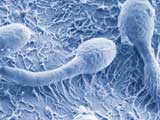Competences
The core competences of the department are in the application of molecular-biological and biotechnological methods for genome, transcriptome, and proteome analysis, and an accredited analytics, which is also suitable for metabolome analysis. To make microbial production as efficient as possible, we use our expertise from the molecular-biological optimization of production strains right up to the development of bioprocesses with integrated, effective downstream processing.
In infection biology, the combination of methods of functional genome analysis with our expertise in cell culture technologies lead to a unique expertise in the development of 3D infection models and test systems (e.g. as for the screening of drugs). For targeted drug delivery, we furthermore develop virus-like particles and therapeutic viruses.
 Fraunhofer Institute for Interfacial Engineering and Biotechnology IGB
Fraunhofer Institute for Interfacial Engineering and Biotechnology IGB